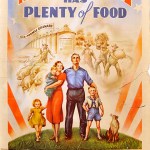agitprop
In my recent essay "300 Years of Fossil Fuels and Not One Bad Gal" I wrote:
...a narrative in which women's entry in the workforce is responsible for our dramatic rise in fossil fuel consumption and carbon emissions can look superficially like a tool for those who would prefer that women go back home and come out of the workforce, and would like to blame feminists and feminism for our present ecological disaster. Indeed, if no one has come up with this ideological claim yet, I'm sure it is only a matter of time before someone explains earnestly to me how wimmen's rights are destroying the…
I give a lot of credit to people who try and make peak oil and climate movies - trying to overcome the natural impulse of most people to say "Let's not go see that movie about how we're all doomed, instead, let's go see The Expendables" is one of those tilting at windmill things I admire. The problem is that even your doomy blogiste here would probably rather watch a decaying Sylvester Stallone than sit through most of the movies. No matter how thoughtful and well told, nothing is going to get your Grandmother or your 19 year old nephew who likes explosions to sit through _The End of…
The realities of climate change and energy depletion mean that at some point, we will encounter situations where there is not enough of an energy resource or one of the things it enables - whether food or transport or whatever, to go around. In fact, eventually we will enounter many of these shortages. Whether they arise initially from a situation in which there are actual shortages or whether the shortages are structural problems of transport or caused by inequity and dishonesty almost doesn't matter - we are going to run bang up against problems of access to resources.
When that happens,…
When Aaron Newton and I conceived _A Nation of Farmers_ we began each chapter with a framing image from World War political posters about food, energy and gardening. We wanted to bring home the point I make in writing in _Depletion and Abundance_ - that at critical moments in our history, including times of war or great economic strain - ordinary daily acts are transferred from the private sphere into the public one. That is, the act of eating, or buying clothing, or travelling from one place to another becomes not a "personal choice" but part of one's basic participation in civil society…

